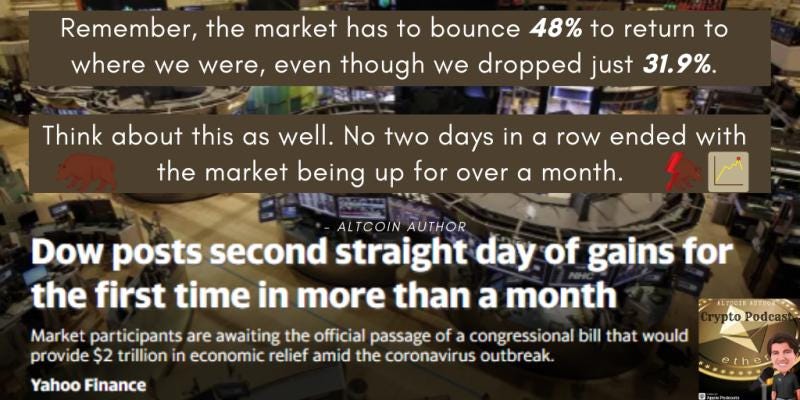Hey guys, Altcoin Author, thanks for checking out my crypto podcast. So let's jump right in.

How's it going, guys? I figured that just because the markets are the way they are and people are asking me about what overall trends and macro developments I should be looking for. Definitely we'll talk about blockchain technology, but I also think it's important to address some of the macro trends and how things are going there from a crypto vantage point, from a blockchain vantage point, from someone in the space that looks to revolutionize the way that a lot of these industries are done specific to the service industry, like accounting and law and different industries that are high paying, and then have inefficiencies that can be tweaked for the benefit of especially small businesses. You're seeing another down market today.

I mentioned on the last episode that for over a month, there was not two consecutive days where the market finished up. That just goes to show that we've hit a level of largely uncharged territory where the volatility is really off the chain. History tells us that in the 1920s, when that 1929 stock market crash happened, it was really accelerated because margin was easy to come by and now, with margin on futures exchanges, and then also on contract for difference platforms, you can really get humongous margin on the S&P on various indexes. And there are traders that try to get in when there's a huge dip on a lot of the platforms, mostly crypto platforms, they have like bankruptcy provisions. So they designate and split a certain amount of revenue that they get for the trades in anticipation that because some of these trades can go in at 101x, or even 125x I've seen for crypto, and for offshore Forex it can be up to 3000x, that, if there's a huge movement, they're going to get closed out.

But a lot of these platforms guarantee that it's not like a margin trade where if it just dumps then you can get sued or they'll come after you. Not only that, but you can actually subdivide and get independent accounts within a single umbrella account. So if one account goes bust, then the other ones will be unaffected. And what a lot of people do is they'll go long in one and short on another with the hopes that when there's a huge movement, one will get closed out, and at the other will rocket up, so really, the absorption of the loss is being felt by the exchange, and historically, a lot of the these crypto exchanges and offshore exchanges that don't fall into the purview of the CFTC or SEC regulations for holding these securities will do a haircut to everyone. They'll take like a percentage of the total assets that are on there so everyone feels the pain.

Obviously, you'd feel it the most if you have the most on there, but the idea is kind of that the community shares in the losses together, but, with this bankruptcy provision, it's not as traumatic for people to pay just a little bit, you know, a little percentage more on each trade. And it adds up nicely, as opposed to seeing that you've spent months and months making gains and you're 30% up, but you have to take a 30% haircut. So after putting dozens and dozens of hours of trying to time the market or trying to identify these macro trends and be at the right place at the right time, you're actually back where you started from. So that's frustrating, and leads people to get angry, mistreat the management of the firm, and often encourage people not to use that particular platform. The market books for crypto as it is are very thin and you see that when there's a big movement, even ones that have a lot of collateral coverage, these order books dry up. So you see people during these huge swings buying Ethereum for five bucks when the true value is many hundreds of dollars.
People do putting in market orders and stack the market books so that if someone mistakenly puts in a market order thinking that was a limit order, then it'll get filled whether you offer market price or a penny. If they get it filled then they immediately can recognize a gain on buying it for $5 and then selling it for $200. So there's a lot of depth issues that you have to consider when you're going into a crypto platform where you're doing some trading. Of course, check with your local jurisdictions and with the laws pertaining to what you can invest in. If you are doing it through a proxy or a partner organization that manages on your behalf for your trust or a different formation that you have for crypto, then make sure you're in compliance there because there are tax ramifications of various trades and I know that in Wyoming that they have new laws that protect you when you go from Bitcoin to Ethereum and having it be a taxable sale, if it's done during the course of the year and you know that they have ways to not make those taxable events, but each state's really figuring it out. And the IRS is just going with what people give them.
It's well known that there are blockchain sleuths that will audit with the help of Coinbase and with a lot of the bigger partners that partner with government agencies that want to keep their bit license or keep their regulations in order because they're publicly traded or they're doing business with Americans, and they're handing over the tax data to the IRS. It's already been widely reported on Cointelegraph that most all the biggest US crypto exchanges at least do provide information about a blockchain address with the social security number or the name of a particular person so the IRS can know that, oh, this person didn't actually claim any gains, but Coinbase associated him with this wallet and it bought a thousand in Bitcoin and then sent it to an exchange when it was work 5 thousand later on so it's something to think about. Be careful because if you're feeling IRS false statements then a costly audit will likely be in your future. Definitely good to be looking at tax considerations when investing. In terms of how crypto tax transactions can benefit you, taking tax losses can be used to offset other passive gains. If you had a bunch of Bitcoin when it was at $10,000 or $20,000, and now it's at $6,000 then you can harvest a good deal of passive losses.
You may be able to made these trades treated as active losses if you qualify based on a certain amount of your time being spent into full-time crypto trading. But at very least these passive losses may be helpful in eating away at any the tax obligations you may have on passive gains. So at this time, when everything's really crashing, it might be a good time to "harvest your losses" by go through your portfolio and see what you can sell, not do a wash sale, but go through and say: Oh, this is highly correlated with this and I already have coverage on this so I'm going to go ahead and close out this position.
As for macro trends, there is a lot of activity surrounding stocks that are not going to particularly do well. I'm thinking Royal Caribbean. I'm thinking stocks that rely upon the travel industry. If you're having a lot of guidance from the government, and it's being doubled down on and reiterated that American should not travel, and then on some sites that I'm on where I do like Airbnb-type travel, a lot of people are canceling through November.
Many of these people watching "AirBNB your way to millions" videos on YouTube are highly leveraged and have 10 properties, and if you're not going to be able to get any revenue between March to November, and you're relying upon the benevolence of the mortgage companies and banks to not foreclose and to give you a little bit of leeway while they figure things out then that's a fragile position to be in. I have heard discussions about instead of going to arrears that the banks' are putting payments on the back end, which would be extremely helpful for people that have overextended themselves. Already I'll say that, yeah, there's a lot of properties that are being thrown in the market because they were bought in 2017, or even 2018, and they've either done renovations and stopped or they don't think that the market is going to bounce back as quickly. So they throw it back on the market and try to recoup their losses, or, ideally, get back what they put in. So very interesting developments there.
In terms of the crypto news specific to a Ethereum, they have a bunch of work being done and GitCoin, which partners with GitHub, and it encourages people to follow and support people in the crypto community that do a lot of watchdog work to the benefit of the community. I like how Ethereum makes a special effort here, with Vitalik Buterin actually giving $90,000 of his own Ethereum to support small-end developers that are doing exciting projects as a hobby or to beef up their Gitcoin/resume, and, in the process, getting a lot of traction like 1inch.exchange with their DEX Aggregator and are doing a lot of good things in the ecosystem. I follow Chris Blec and he does a lot of watchdog work and following all of these DAOs that are trying to push out their product and get things go with their own situation, because they see a lot of the volume, they see that DeFi hit a $1 billion briefly before Ethereum got rekt.

While it that took away a lot of market cap, it's still $600 million+ in terms of actual US dollars. So there's a lot of money there to be had. And people recognize that people who are that are at the forefront of crypto are doing well. They're getting a lot of backing from these small seed crypto funds, or people that recognize there's a huge disconnect between people doing something in their dorm room and someone like MakerDAO that is scaled or like Nuo that scaled in the defy space and are getting, you know, money from Sequoia and money from some of the biggest VC firms and lots of zeros. So it's kind of like as a middle ground. And if things can be kept open source like Vitalik talks about then a lot of good can come of Ethereum and all the code will be open source on explorers using the solidity so people can go on audit what they're actually interfacing with, you know, with pool together and all these bigger platforms that are being very transparent. And the transparency does give you a little bit of vulnerability in their terms that someone could reverse engineer exactly what you're doing. And then you're just really a marketing component behind that, like a brand behind that, because someone can literally do the exact thing that you do. And then it's really the value that you're bringing in the strength and integrity of your team. And then, as well, the marketing that surrounds it. So there really is a lot of magic dust or IP/trade secrets that has been evaporated with this level of transparency, but I think that's good for the ecosystem. And I like that Vitalik likes to encourage that innovation and imagination, because all these pet projects really do advance the ecosystem. And that's really been the reason why Ethereum has taken a leadership role in DeFi whereas it could have been done just as easily with Tron or with some of the other ecosystems that give you a certain amount of "energy," in the case of Tron, to do transactions for free whereas with Ethereum, it can be expensive but usually is relatively low, except during huge price movements when it can really jump up to $1 or $2. Even Chris Blec said up to $10 to send a little bit at peak periods. Thankfully with Ethereum the block times are incredibly swift so you don't have to pay very much and you can still reasonably expect to get confirmations in the next half an hour.

I'm looking forward to interviewing a few people in DeFi that I've met at my crypto conference travels and with whom I've stayed in touch. So we're having an exciting interview lined-up for next week who is one of the leaders of DeFi. He'll talk a little bit about the ecosystem, and how it really is changed in many ways, and how it's morphed since really even a few years ago when there has been very little activity to today when DeFi applications, on a day to day basis, enjoy many thousands of daily/24 hour users of these platforms and are generating enormous fees. These are actual people and, from what I've seen, relatively few bots, and I looked at a lot of the addresses and there's a lot of activity indicative of human activity. So I do see a lot of people tweeting about these same dApps so the excitement is palpable.
It's an exciting time for the space and to be moving forward with these types of applications and seeing DeFi and decentralized applications as a whole exploding into something much bigger, despite the fact that Ethereum is way down in price, is definitely exciting. Whether it goes one way or the other doesn't necessarily matter as when you invest you should have a long time-horizon. You should be there for the underlying technology, because that's what's really driving the innovation. And that's what's making some projects rise to the top and others flounder when some of the founders get discouraged with the Bitcoin going down or discouraged with the Crypto Winter that's negatively impacting their ability to float their coins and advanced whatever project they're trying to promote. The ones that are resilient are those that have been in the space for a while, are making regular advances, and have an active GitHub. Talk to you again, on Monday. Stay safe, pandemic peeps.
You've been listening to the Altcoin Author Crypto podcast. Thank you very much. And please remember to subscribe, go to my website, AltcoinAuthor.com, where I have a lot of free content specific to crypto have a newsletter with Altcoins.Substack.com, an ebook with Amazon "dApp Ubiquity: Anticipating the Avalanche of Adoption." Please listen to the episode up next if you're streaming or downloading. Subscribe to get access immediately to new podcasts.






